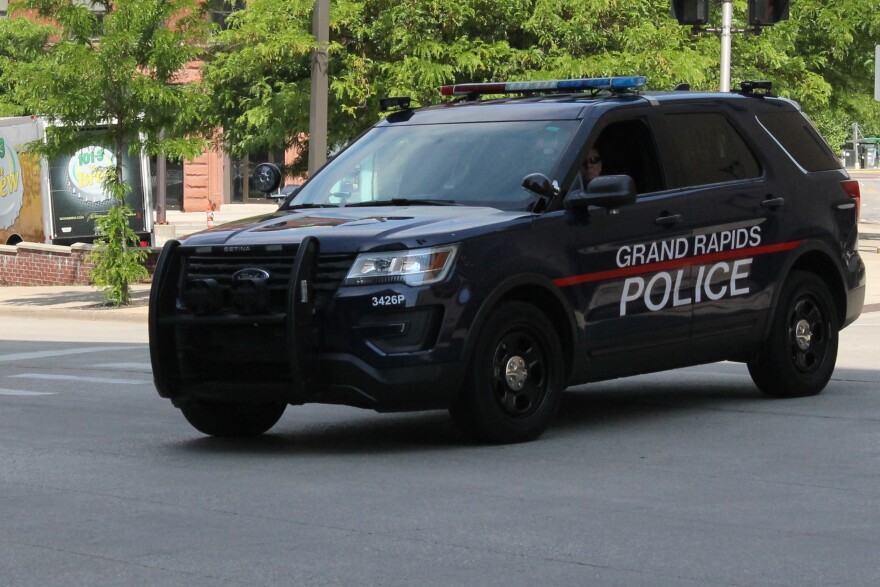Black residents in Grand Rapids have thought for decades that the city’s police targeted them unfairly. But atraffic study released last year put some data behind these long-held beliefs.
And a year out from that study, there's a wide gulf between how residents and the police department think about whether things can improve.
Click here to read about Michigan Radio's look at what the data do and don't tell us
Four years ago, Elaine Howell was on her way to work at Meijer. It was in the early hours of the morning so it was still dark out. She noticed a police car following her as she approached an intersection on the southeast side of town.
“I noticed from the top of the car that it was a police officer behind me, and I told myself get ready because I know he’s going to stop me,” Howell said.
Howell kept driving with the police car behind her for about a mile. Once she pulled in to the Meijer parking lot, she saw flashing lights.
“My heart started racing, and I said, 'Hey, you didn’t do anything wrong,' and I kept my hands on the steering wheel. I didn’t reach for anything, I let them instruct me,” Howell said.
Her fear was heightened by what she saw next.
“When he approached my car, he also had his hand on his gun,” she said.
The officer gave her a speeding ticket. But it was later voided after police looked at traffic cam footage that showed she was actually going below the speed limit.
Howell made it out of that situation without any physical harm. But her trust in the Grand Rapids Police might be lost forever. And she’s not alone in that mistrust.
"When he approached my car, he also had his hand on his gun." - Elaine Howell
Black residents have long criticized the department for questionable stops just like this.
Last year, a traffic study showed that between 2013 and 2015 black drivers were twice as likely to be stopped by police as white drivers in the city.
The department started getting more intentional with implicit bias training for its officers, making sure to really examine why officers make the choices they make when dealing with civilians.
It’s only been a year since the ball got rolling on this, so the city’s chief of police, David Rahinsky, acknowledges that residents might not see a big change quite yet.
“It’s an ongoing effort, it’s not a one and done. There’s no magic potion for these types of issues. But this is a great community, this is a great police department, and I have no doubt that collectively we’ll get to where we want to be,” Rahinsky said.
The department has an outside consulting firm looking through the policies and proceduresofficers follow. They’re trying to ensure that there aren’t any disparate outcomes for any particular group of people.
But some residents are skeptical.
Ladonna Norman is a black woman who frequents public meetings to discuss issues like police bias.
Norman was stopped by police back in January. She says everything about the stop was odd.
“It got to the point where I’m about to have an anxiety attack, I’m not feeling well, I’m anxious and the police have me pulled over and they start questioning my identity,” Norman said.
She says police stopped her for not using a turn signal. But for some reason they started asking questions about her twin sister. Because Norman was nervous about the stop, she decided to start broadcasting a Facebook Live stream of her encounter.
Norman wasn’t ticketed or physically harmed, but her idea of the city’s police was further soured.
Norman thinks the police department is inherently racist, and that no amount of training or community meetings can change that.
“They’re trying to rebuild something that was systematically set up for us to fail,” she said.
People living in predominantly black neighborhoods in the city often responded negatively when asked about their feelings towards Grand Rapids police.
"They're trying to rebuild something that was systematically set up for us to fail." - Ladonna Norman
One four-letter word was used by several residents, but there were people who had more constructive criticisms of the department.
Darrian Colbert is a Grand Rapids native who thinks black residents have been pushed around for too long.
“We aren’t going to wait forever. Eventually it’ll get to a breaking point. Everything [does]. When you oppress people, they rise up in a fiery anger,” Colbert said.
So the Grand Rapids Police Department has two jobs ahead of it: The first is acknowledging and fixing any bias in how it polices black neighborhoods. The second – which might be even harder – is building trust with black residents.






